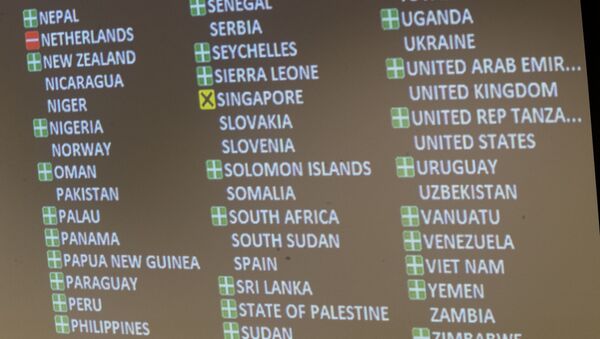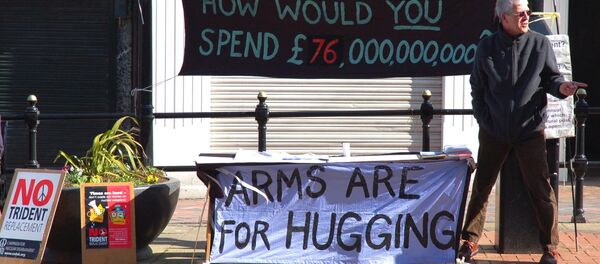A number of nations have signed the UN Treaty on the Prohibition of Nuclear Weapons, in search of a world liberated from "doomsday" weapons, as UN Secretary General Antonio Guterres once said. However, the world's nuclear powers — both official and unofficial — aren't quite as enthusiastic.
Here it is. The original copy of the UN Treaty on the Prohibition of Nuclear Weapons – now signed by 50 nations. #nuclearban #UNGA pic.twitter.com/Uy78Vk8R5k
— Tim Wright (@TimMilesWright) September 21, 2017
It is assumed nine countries possess nuclear weapons — the US, UK, Russia, France, China, India, Pakistan, Israel and North Korea, and the Stockholm International Peace Research Institute (SIPRI) estimates they collectively hold roughly 15,000 nuclear warheads.
This vast arsenal isn't evenly distributed across the nonet, with the US and Russia possessing around 93 percent of the total.
Of the 14,935 total #nuclear weapons, #Russia and #US together possess 13,800. #SIPRIFacts pic.twitter.com/9LDsgr2rz1
— SIPRI (@SIPRIorg) July 3, 2017
Official Nuclear Powers
The US, UK, Russia, France and China are signatories of the 1968 Nuclear Non-Proliferation Treaty — the world's earliest nuclear disarmament initiative — while the remaining quartet are not (although North Korea was temporarily, withdrawing from it in 2003).
Disarmament Efforts
The Nuclear Non-Proliferation Treaty obliged signatories to eventually rid themselves of such weapons, although it did little to stop the international spread of nuclear weapons — although, despite the number of nuclear weapon-equipped states rising since 1968, there are far fewer nuclear warheads in 2017 than during the Cold War.
The US and Russia, as a result of a new Strategic Arms Reduction Treaty inked in 2010, are leading the push for arms reduction, depleting their warhead stockpiles and dismantling delivery systems.
However, with President Donald Trump's policy of increasing the US' defenses, the fate of START's future may now be uncertain. His administration has indicated the US may withdraw from the Intermediate-Range Nuclear Forces Treaty to aid upgrades and expansion of their stockpiles.
New @SIPRIorg data on World Nuclear Forces 2017: Overall numbers decline but modernization a priority #SIPRIfacts https://t.co/gwsmmdZoib pic.twitter.com/HeyoFqfeB6
— Maaike Verbruggen (@M__Verbruggen) July 3, 2017
Moreover, several nuclear powers have effectively offset reductive progress by developing or deploying new nuclear weapon delivery systems, or announcing their intention to do so.
Most notably, the US is expected to spend US$400 billion between 2017 and 2026 on maintaining and comprehensively updating its nuclear forces.
In a July report, SIPRI cited estimates Washington may spend up to US$1 trillion over the next 30 years on this modernization program.
The UK also backs implementation of the Trident nuclear system's successor, and France has signaled a desire to modernize its capabilities, including the creation of a next-generation ballistic missile submarine by 2035.
China — Asia's biggest nuclear power — has embarked on a long-term modernization program focused on making qualitative improvements to its nuclear forces, rather than on significantly increasing their size.
While details are sketchy, there are suggestions Israel has developed a new intermediate-range ballistic missile, and there are unconfirmed reports Tel Aviv may be equipping its fleet of six German-built Dolphin class diesel-electric submarines with nuclear-armed SLCMs.
Nonetheless, Ukraine, Kazakhstan and Belarus represent an example of successful disarmament — the states all signed START I with the US, and lived up to their commitment to dismantle their nuclear stockpiles accumulated during their time as republics of the Soviet Union. In Ukraine's case, the arsenal was particularly vast — but now largely non-existent.
Nuclear Ambitions
A number of countries have embarked on nuclear weapons programs, but have since renounced their aspirations. For instance, Iran rejected any military use of nuclear technology as part of an international agreement in 2015, supervised by the International Atomic Energy Agency.
There are strong suggestions some states, such as Saudi Arabia, wish to possess nuclear weapons, but conclusive evidence and/or proof of these ambitions remains elusive.
Ban Prospects
The Treaty on the Prohibition of Nuclear Weapons may well be doomed to fail — after all, the agreement is purely symbolic, and there is little non-nuclear states can do to compel nuclear-equipped countries to disarm — especially as every member of the permanent UN Security Council retains them.
NATO is not convinced about the initiative either, with a spokesperson saying it "clearly disregards" the realities of the international security environment.
Jean-Yves Le Drian, foreign minister of official nuclear power France, called the Treaty "wishful thinking… almost irresponsible."



